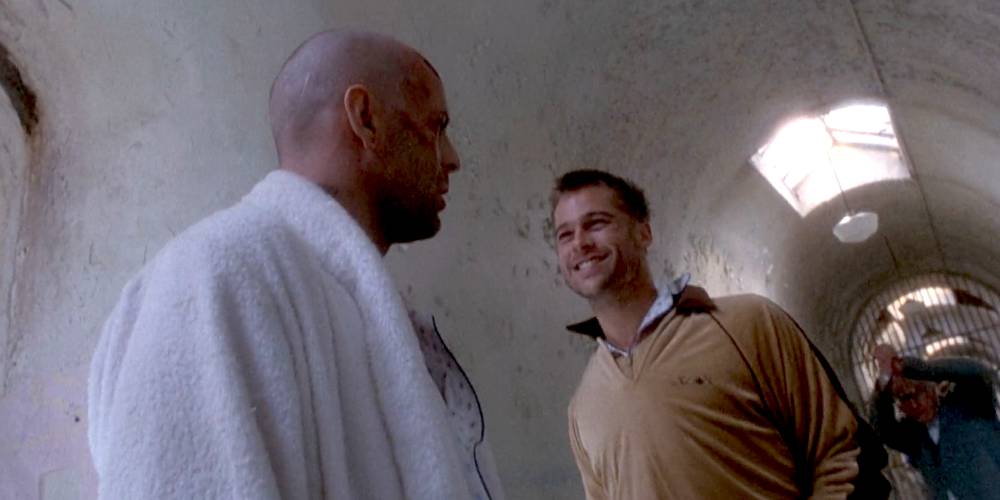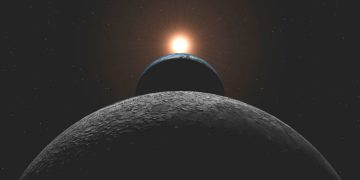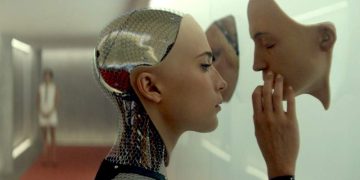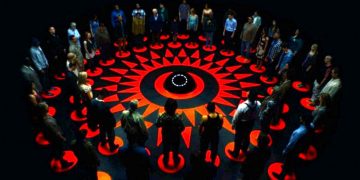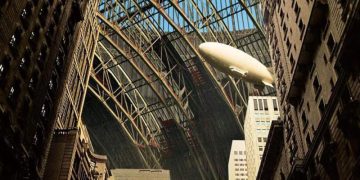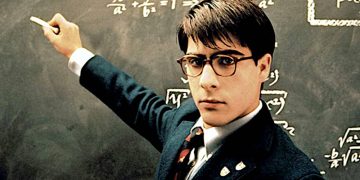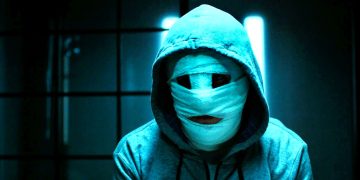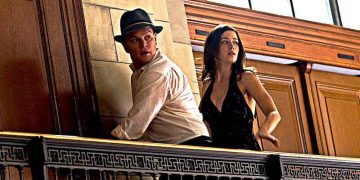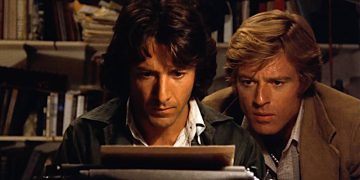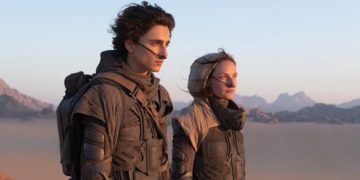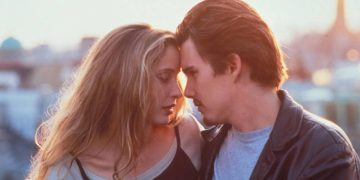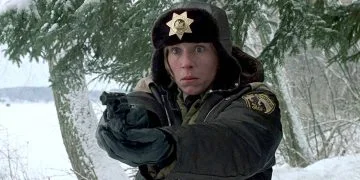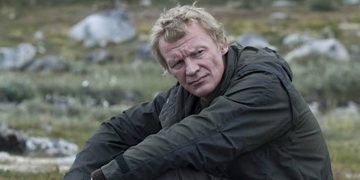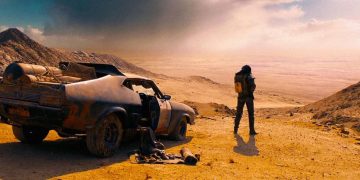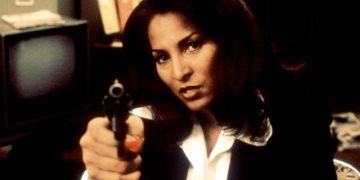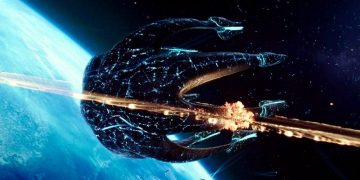Humanity seems to have a pretty dismal view of the future, even though it's entirely in our own hands. Storytellers love to warn us of the dangers of technology, politics, and social divide.
There's an entire genre dedicated to it: dystopian movies, often delivered with a futuristic sci-fi angle that paints a grim outcome of what's ahead, allowing us to see that bleak reality unfold right before our eyes.
But beyond mere entertainment value, what are the deeper messages that we need to take in? Here are the best dystopian movies of all time that are deep, meaningful, and important.
15. WALL-E (2008)
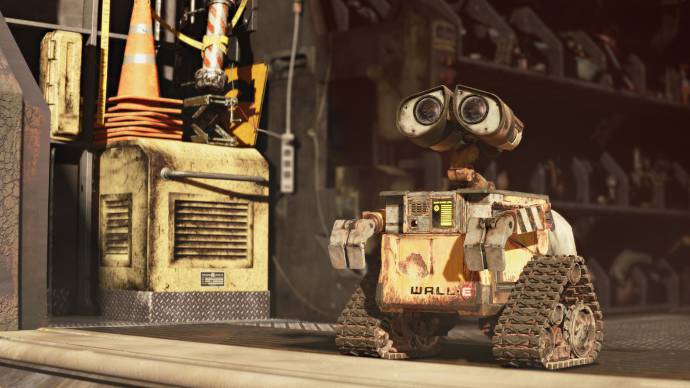
Directed by Andrew Stanton
Starring Ben Burtt, Elissa Knight, Jeff Garlin
Animation, Adventure, Family (1h 38m)
A Pixar animated film might seem like a silly entry on this list, but WALL-E is surprisingly existential and dystopian. Director Andrew Stanton goes beyond just teaching kids to recycle—he paints an eerie future that's not dissimilar to our current day.
When we open to a barren landfill, we assume the message of WALL-E is going to be about littering less. However, we soon learn that the film is speaking more to extreme consumerism and corporate greed, both of which turned Earth into a desolate wasteland.
WALL-E is the last remaining robot made by humanity in a last-ditch attempt to salvage Earth. By 2085, the trash-compacting robot plan has failed and the dregs of humanity now live on giant spaceships.
But the allegories don't end there! When WALL-E eventually boards one of these ships, we find the entire human race to be morbidly obese and hovering on chairs, perpetually stuck to their hologram screens.
The humans never once look up from their devices—so much so they don't even know that they're on a ship or how they got there. If they want a milkshake, it just magically appears! WALL-E is like an animated The Matrix, showing us how dangerous on-demand convenience is.
From a spiritual lens, WALL-E teaches New Age and Buddhist beliefs of anti-materialism, presence, mindfulness, and opening the third eye to reality. From a Catholic POV, WALL-E and his girl-bot friend EVE replanting the Earth is symbolic of the Garden of Eden.
14. The Hunger Games (2012)
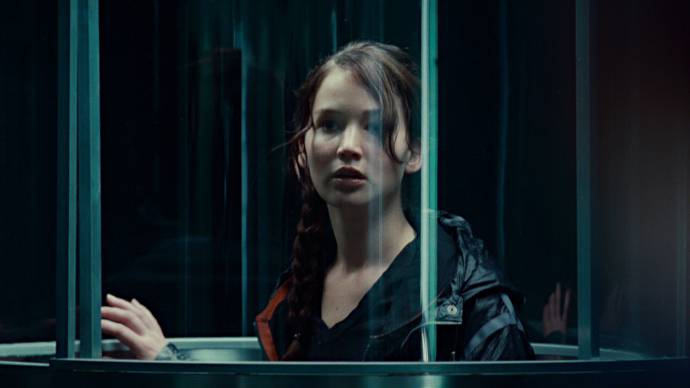
Directed by Gary Ross
Starring Jennifer Lawrence, Josh Hutcherson, Liam Hemsworth
Action, Adventure, Sci-Fi (2h 22m)
The Hunger Games is pretty heavy-handed in its critiques of modern American culture: classism, exploitation, and capitalist consumerism.
The franchise centers on a post-apocalyptic society in the year 2147, where real people are placed in a live tournament to the death—all in the name of reality TV entertainment. This tournament is broadcast throughout the nation for all to watch.
In reality, the "Hunger Games" serve as a form of punishment for the 12 Districts (which are separated by class) for their attempted rebellion years prior. The punishment is that each District must choose two people to sacrifice as tribute to the Games.
The Games are used as a tool of oppression and fearmongering by the wealthy elite, who glamorize the tournament for amusement. Their outlandish outfits are strikingly similar to our own Met Gala.
The book series by Suzanne Collins was a hit among young adult readers, then adapted into a movie franchise by Gary Ross. The four films star Josh Hutcherson and Jennifer Lawrence (who ironically became a celebrity commodity herself with its success).
13. A Clockwork Orange (1971)
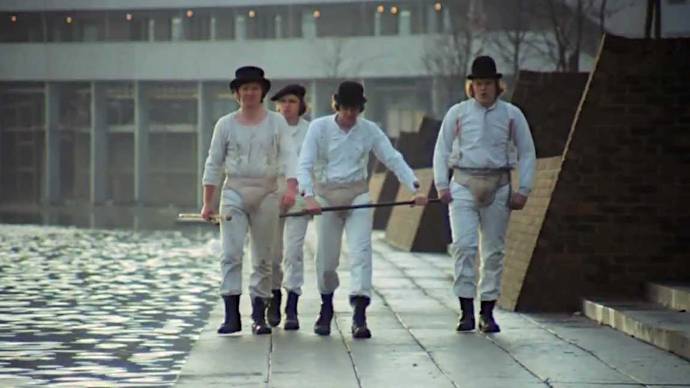
Directed by Stanley Kubrick
Starring Malcolm McDowell, Patrick Magee, Michael Bates
Comedy, Drama, Crime (2h 16m)
Once people got over the shock factor of its graphic scenes, viewers started to take note of the deeper message in A Clockwork Orange. The original book by Anthony Burgess has been analyzed and studied for decades, so we have a lot of condensing to do here.
Essentially, A Clockwork Orange is about an amoral delinquent who stands for the struggle between good and evil. Although Alex (played by Malcolm McDowell) is controversially violent and sadistic, he's also incredibly smart, charming, and arguably the most "alive" character.
The government's interference with society is born from its desire to maintain power and stability, not make it a better place. The morality forced upon Alex (via torturous methods) means that it doesn't really count; it zombifies him rather than redeeming him.
The title A Clockwork Orange refers to turning a good and natural thing (e.g. an orange) into a hollow mechanism. The semi-totalitarian government of Stanley Kubrick's dystopia is willing to sacrifice free will and rights, harking to an Orwellian future that might await us.
12. Never Let Me Go (2010)
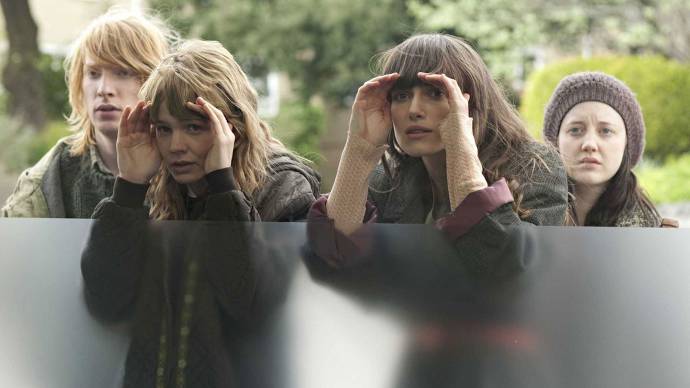
Directed by Mark Romanek
Starring Keira Knightley, Carey Mulligan, Andrew Garfield
Drama, Romance, Sci-Fi (1h 43m)
Kazuo Ishiguro's acclaimed dystopian novel is an accumulation of beauty and lightness, mixed with horror and fear. Mark Romanek's movie adaptation is no different and perfectly captures the visceral, dream-like quality of love amidst dark science fiction.
Never Let Me Go is set in an idyllic English boarding school, where students are brought up under constant supervision and forcibly cut off from the outside world.
What's not immediately clear—to the characters or the viewers—is that the students are clones. These clones are replicated from ordinary citizens and used for their organs when they become adults.
The story acts a warning against the free use of scientific experimentation without any moral consideration. As technology develops, our world has become increasingly okay with playing God, which is always a risky path.
11. 12 Monkeys (1995)
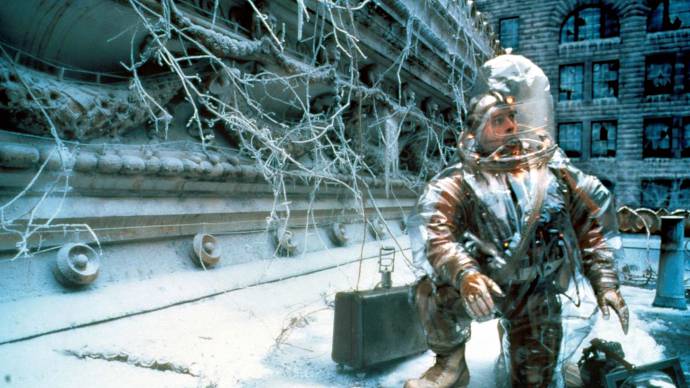
Directed by Terry Gilliam
Starring Bruce Willis, Madeleine Stowe, Brad Pitt
Mystery, Sci-Fi, Thriller (2h 9m)
Terry Gilliam's time-traveling sci-fi thriller was inspired by the 1962 short film La Jetée by Chris Marker.
12 Monkeys follows the back-and-forth journey of James Cole (played by Bruce Willis) between time periods: a dystopian future in 2035 and "present day" 1996 (which was true at the time the film was released).
The future is ravaged by a deadly virus that forces humanity underground, so Cole is sent back to 1996 to investigate the cause of the outbreak—but he's accidentally sent back to 1990 and incarcerated in a mental hospital.
12 Monkeys is a dystopian story about the subjective study of memories and time, showing us how the past is a fixed state that can never be altered no matter how hard we try.
In a post-COVID-19 world, viewers have drawn parallels between the movie's virus and the coronavirus. In 12 Monkeys, the virus is purposefully released to the public and anyone who questions it (such as Brad Pitt's anarchic, anti-corporatist character) is declared insane.
Of course, the theory that COVID-19 was manmade is just a theory. However, it does show how creepily accurate cinematic dystopias can be, as Bruce Willis walks through a paranoid, virus-ridden world full of graffiti that reads "Is there a virus? Is there a source?"
10. Metropolis (1927)
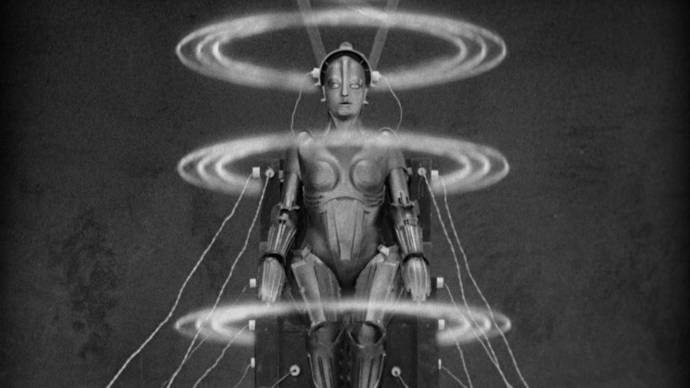
Directed by Fritz Lang
Starring Brigitte Helm, Alfred Abel, Gustav Fröhlich
Drama, Sci-Fi (2h 33m)
A key movie from the German Expressionist movement, Metropolis is a highly-stylized sci-fi movie that came to influence many of the other films on this list (including The Matrix and Blade Runner).
Metropolis was audacious and revolutionary for its time, standing as one of the pillars of early silent cinema. Directed by Fritz Lang, it takes place in a futuristic utopia where Freder (played by Gustav Fröhlich) uncovers a bleak world of oppressed workers underground.
Lang drew aesthetic influences from Cubism, Bauhaus, and opera during the Weimar period. As for its allegory, Metropolis reflects the state of Germany's sociopolitical climate in the 1920s.
Adapted from Thea von Harbou novel from 1925, Metropolis offers a visual representation of inequality and exploitation beneath the glossy surface of modernization. Even in the 21st century, this still applies.
9. 1984 (1984)
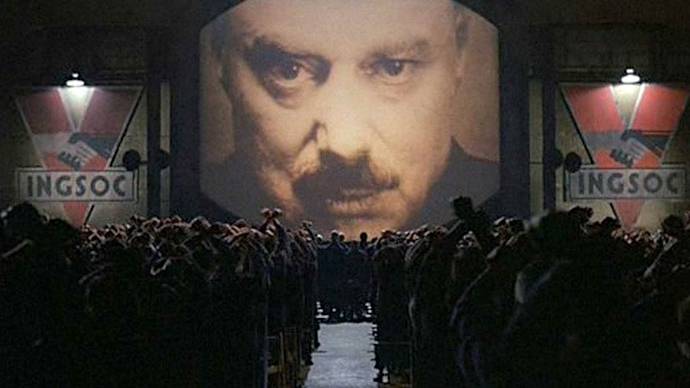
Directed by Michael Radford
Starring John Hurt, Richard Burton, Suzanna Hamilton
Drama, Sci-Fi (1h 53m)
The term "Orwellian" describe a state of bleak, totalitarian domination. It comes from George Orwell, who wrote a number of books, the most enduring one being the allegorical dystopian novel Nineteen Eighty-Four (often simply referred to as 1984).
It's often compared to Aldous Huxley's Brave New World, which also explores futuristic dystopia through a different lens. They're two sides of the same spectrum.
Whereas Huxley proposes that humanity will be brainwashed using pleasure and materialism, Orwell suggests it'll be done through complete censorship and control. Orwell's authoritarian landscape of Oceania is widely studied as a caution against totalitarianism.
Michael Radford took a stab at bringing this heavily detailed classic novel to the big screen. John Hurt stars as Winston Smith, a "prole" (working-class man) whose job is to constantly rewrite history under the watch of Big Brother. Sounds familiar, no?
8. Minority Report (2002)
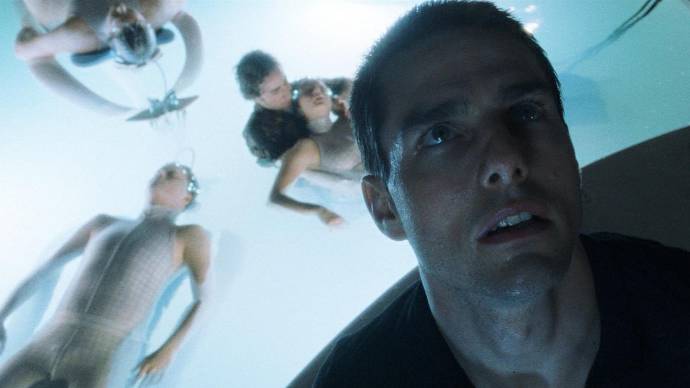
Directed by Steven Spielberg
Starring Tom Cruise, Colin Farrell, Samantha Morton
Action, Crime, Mystery (2h 25m)
Tom Cruise loves a good sci-fi action movie, and this is one of his best. Minority Report, directed by Steven Spielberg, is based on Philip K. Dick's 1956 novel of the same name.
Cruise plays John Anderton, the head of a futuristic crime unit that predicts crimes before they happen and arrests the perpetrators before they can commit the crimes.
These predictions come from three "Precogs" who have psychic abilities, and one of them comes to predict that John Anderton himself will commit murder in 36 hours.
"Science has stolen most of our miracles," Minority Report warns us. The film is a constant battle of free will versus fate, combining the world of Hollywood with ancient philosophy.
Just as 12 Monkeys suggests the past is always fixed, can the same be said about the future? It's an interesting question to set your mind to, which Spielberg presents in his usual thrilling way.
7. The Lobster (2015)
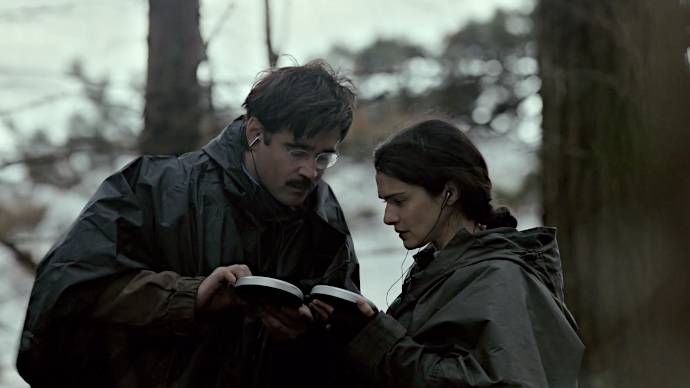
Directed by Yorgos Lanthimos
Starring Colin Farrell, Rachel Weisz, Léa Seydoux
Drama, Romance, Sci-Fi (1h 59m)
Yorgos Lanthimos is an auteur with distinct style: black comedy, deadpan deliveries, ambiguity, and avant-garde cinematography.
The Lobster is the first in a sort of anti-Hollywood trilogy, followed by The Killing of a Sacred Deer and The Favorite. It takes place in a surreal future where single people are given 45 days to find a life partner or else they'll be turned into an animal.
Colin Farrell stars as David, who's escorted to a strange hotel after his wife leaves him. The hotel is strict on its rituals and forces its guests to watch propaganda videos—and everybody's deadline (literally) can be extended by capturing "singles" who are living in the forest.
Quirky would be an understatement for The Lobster, which can be read as a message against society's (and the media's) obsessive need to find a partner in order to be "complete."
6. Planet of the Apes (1968)
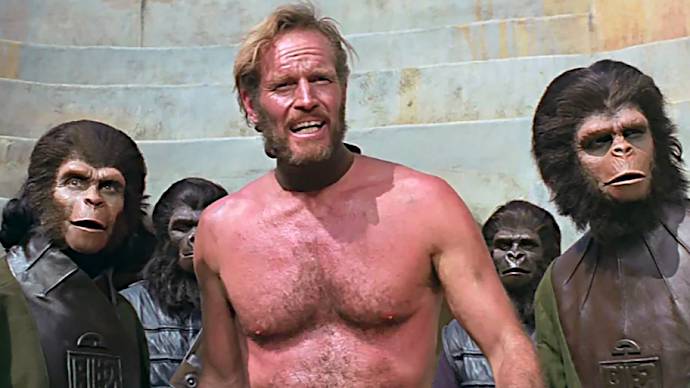
Directed by Franklin J. Schaffner
Starring Charlton Heston, Roddy McDowall, Kim Hunter
Adventure, Sci-Fi (1h 52m)
The Planet of the Apes is such an iconic film because viewers don't even realize it's set in on a dystopian Earth until the end.
Charlton Heston stars as Taylor, an astronaut who crash lands on a curious planet 2006 years after his departure from Earth in 1972. He's quickly captured by a group of armed gorillas and put in prison.
In this world (which we assume is a different planet until the Statue of Liberty is revealed), it's the apes who do all the talking while the primitive humans remain mute. Themes of animal rights, immigration, and race are symbolized through the reversed roles of animal and humans.
The Planet of the Apes has had a vast number of remakes and sequels following its success, but none have managed to top the original.
5. Brazil (1985)
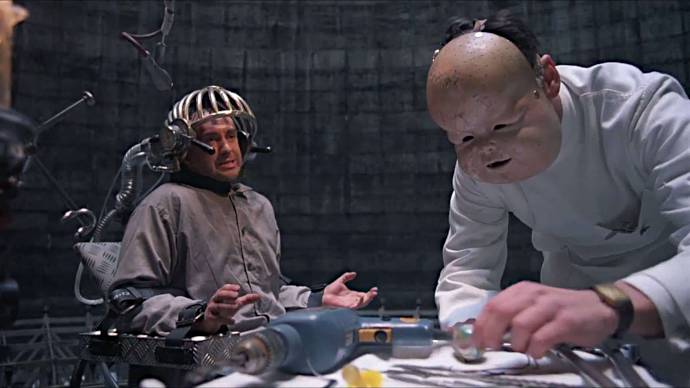
Directed by Terry Gilliam
Starring Jonathan Pryce, Kim Greist, Robert De Niro
Drama, Sci-Fi, Thriller (2h 12m)
Brazil is a solid contender for Terry Gilliam's best movie. It's certainly his most complete work as the director notoriously can't catch a break on his nightmarish projects!
Brazil doesn't try to hide its Orwellian influence, but it does present it all with a black-comedy spin.
Here we have a hyper-consumerist, totalitarian world that runs on mind-numbing labor and an unnatural obsession with youth. The humor of Brazil makes its disturbing and depressing dystopia even more potent.
How uncanny it feels to laugh in a place like this—a place that doesn't feel all too far away from us. "Right this way" to a "nightmare of reality," where the twisted angles and fish-eye lenses act like a funhouse mirror to our own near-future.
4. Stalker (1979)
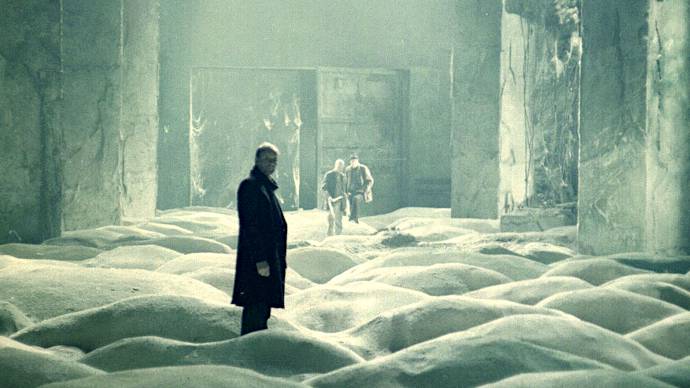
Directed by Andrei Tarkovsky
Starring Alisa Freyndlikh, Aleksandr Kaydanovskiy, Anatoliy Solonitsyn
Drama, Sci-Fi (2h 42m)
Stalker is perhaps the creepiest pick on this list because it was so accurate in its predictions. Andrei Tarkovsky's Soviet sci-fi is a trophy of arthouse cinema, partially based on the 1972 novel Roadside Picnic.
Tarkovsky shows off his affinity for the theological and dreamlike, taking his usual slow pace in a journey across the "Zone" where the laws of physics don't exist. Inside the Zone is "Room"—a place where your innermost desires are granted upon stepping inside.
This plot is only a basic framework which Tarkovsky fills with a dense, kaleidoscopic exploration of human consciousness. Stalker definitely isn't a light watch. But where do the predictions come in?
The hazardous Zone is reflective of the exclusion zone around Pripyat in Ukraine following the Chernobyl nuclear disaster. What's creepy is that Chernobyl didn't happen until 7 years after Stalker's release.
In fact, if you go on a tour guide of the Chernobyl site, you'll find that food stalls and gift shops are named after—and use quotes from—Stalker. Tarkovsky and his wife even died of contamination from a chemical plant located near the set of Stalker.
3. Children of Men (2006)
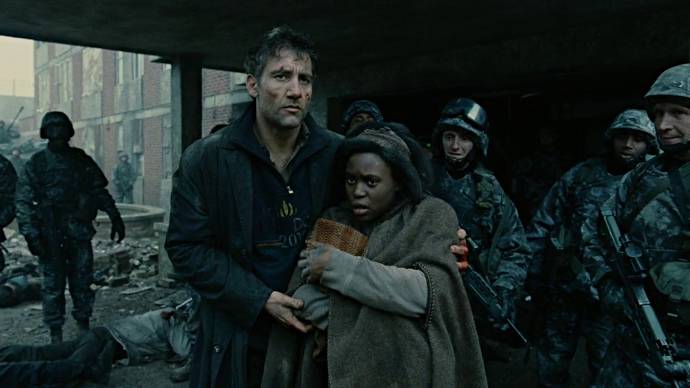
Directed by Alfronso Cuarón
Starring Clive Owen, Julianne Moore, Chiwetel Ejiofor
Action, Drama, Sci-Fi (1h 49m)
Children of Men isn't a warning against materialism, artificial intelligence, pollution, or any of the usual subjects of dystopian fiction. It's about the perils of anti-immigration and anti-refugee sentiments.
Although the main plot of the film is centered on a global infertility crisis, everything unfolds over the backdrop of border guards, immigrants in cages, and manhunts. Already Children of Men feels prescient.
Today's world news footage reels of refugees fleeing from war, drowning in oceans, and being held captive are increasingly similar to the sequences found in Children of Men.
Alfonso Cuarón's sci-fi thriller is set in England, 2027, which has turned into a police state after the collapse of the economy and the normalization of terrorism. Even the only pregnant woman in an infertile world isn't free to cross borders to safety without transit papers.
2. Blade Runner (1982)
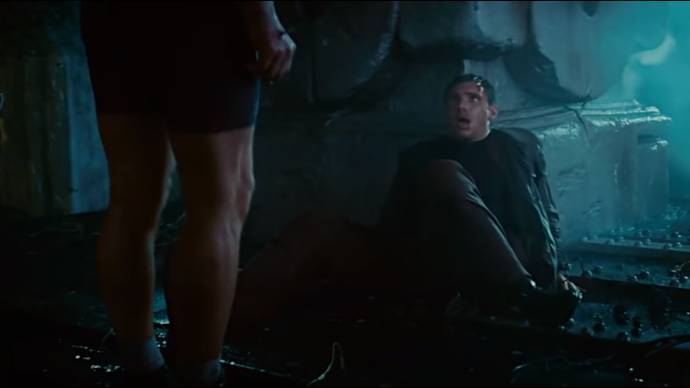
Directed by Ridley Scott
Starring Harrison Ford, Rutger Hauer, Sean Young
Action, Drama, Sci-Fi (1h 57m)
Blade Runner was hell to make, but the tension on set ostensibly helped with the film's dreary tone. The overcrowded, neon-lit cityscape of Ridley Scott's sci-fi classic shows the adverse affects of over-consumption and mass advertisement.
Blade Runner stars Harrison Ford as a hunter of Replicants (bio-engineered beings that look like humans) who have escaped. The dystopian Los Angeles was inspired by the urbanism of Hong Kong and Tokyo, putting an apocalyptic spin on modern living.
In fact, a still shot of Blade Runner could easily be mistaken for a real city, which isn't reassuring.
It's rare for a sequel to meet the bar set by an original—especially a film that's as culturally significant as Blade Runner. But Denis Villeneuve pulled it off in the gorgeously shot sequel Blade Runner 2049 starring Ryan Gosling.
1. The Matrix (1999)
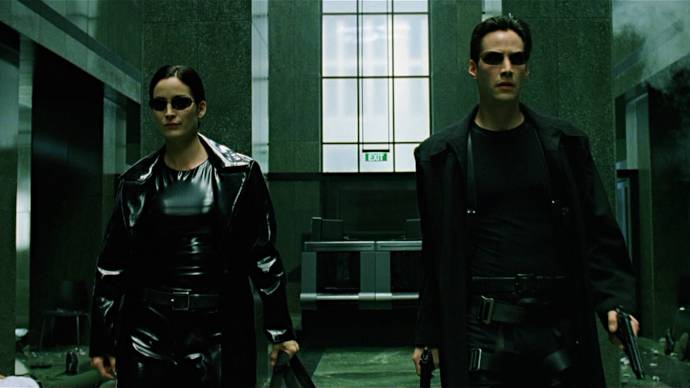
Directed by Lana Wachowski and Lilly Wachowski
Starring Keanu Reeves, Laurence Fishburne, Carrie-Anne Moss
Action, Sci-Fi (2h 16m)
Few films have had as much impact on the action genre (or even cinema as a whole) as The Matrix. The trilogy revolutionized action sequences on the big screen with its use of sleek, innovative CGI inspired by Japanese animation.
In The Matrix, everyone believes they're living in the year 2199. In reality, it's 1999 and everyone is walking in a shared simulation. However, anyone who's aware of the simulation is able to bend the laws of nature and physics via programming.
Keanu Reeves plays Neo, a computer specialist who's unplugged by the rebel Morpheus. Morpheus offers a choice: the Red Pill or the Blue Pill? Taking the Red means waking up to the truth of the Matrix. Taking the Blue means staying blissfully asleep within the simulation.
The Matrix forces viewers to consider their own choice between the real world and the virtual. It explores the role of free will and recognizes that there's more to life than meets the eye.
The world of The Matrix has become so deeply rooted reference in pop culture. You've probably heard it yourself: when something weird or illogical happens, it's called a "glitch in the Matrix." Right?
